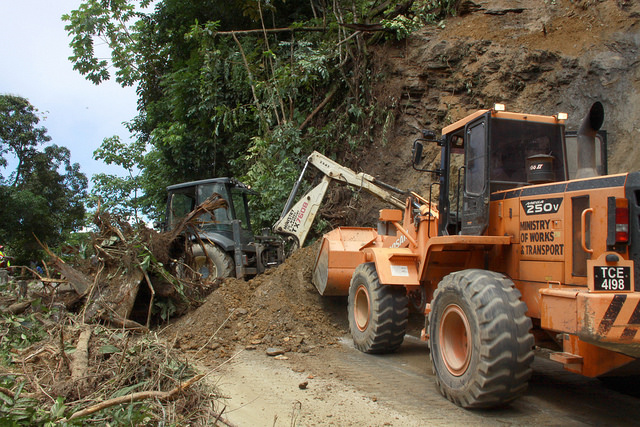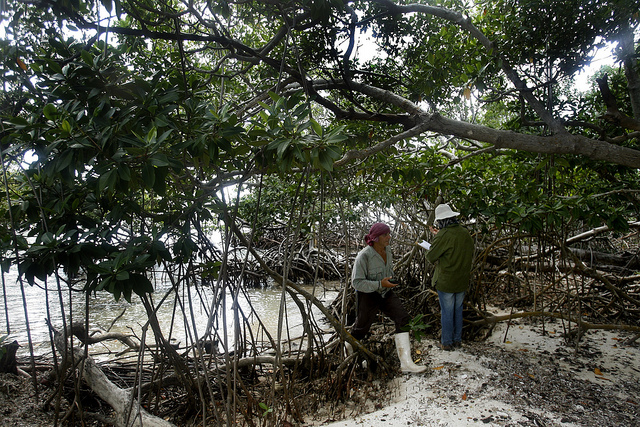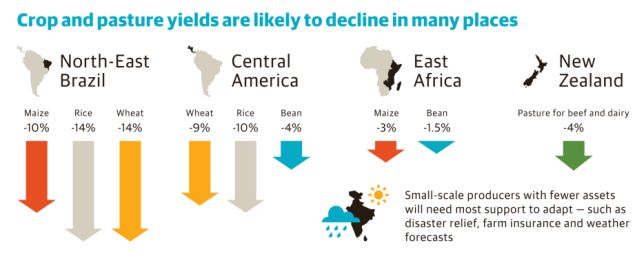IPCC Climate Report Warns of “Growing Adaptation Deficit”

The latest update of the world's scientific consensus on climate change finds not only that impacts are already being felt on every continent, but also that adaptation investments are dangerously lagging.3
These investments constitute both a key demand by developing countries and a key pledge by the West. Nonetheless, the latest report by the Intergovernmental Panel on Climate Change (IPCC), released on Monday in Japan, warns that these shortfalls are growing.
"Global adaptation cost estimates are substantially greater than current adaptation funding and investment, particularly in developing countries, suggesting a funding gap and a growing adaptation deficit," the report states.
"Comparison of the global cost estimates with the current level of adaptation funding shows the projected global needs to be orders of magnitude greater than current investment levels particularly in developing countries."
Further, the report underscores that adaptation shortfalls, as with the broader impacts of climate change, would most significantly affect communities that are discriminated against, particularly in developing economies.
"The report makes very clear what a large adaptation deficit there is while also recognising that, though there's been a lot of progress on vulnerability, people who are marginalised tend to be the most vulnerable," Heather McGray, director of vulnerability and adaptation at the World Resources Institute, a think tank here, told IPS.
"This plays out in the debate between developing and developed countries, covering the livelihoods of indigenous peoples and fisherfolk, small farmers dependent on climate-sensitive environments, as well as children and the elderly, those with constrained mobility or higher health risks. More thorough and nuanced treatment of these issues is certainly a step forward."
Medium agreement
The IPCC, which is overseen by the United Nations, has been publishing climate-related assessments since the early 1990s. The new report is the work of nearly 2,500 authors and reviewers, and constitutes part of the IPCC's fifth such assessment.
The report is actually made of three sections, with the one released Monday, the second, focusing on impacts and adaptation. It differs from previous iterations in its far robust understanding of the current state of climate change, describing its ramifications as widespread and consequential.
Yet it also warns the world is "ill-prepared" for these changes, and places far more focus than in the past on adaptation. In part, this is because global mitigation efforts have thus far been relatively ineffectual, thus requiring planning for significant impact at least in the near term.
 Risk evaluation is a first step towards a climate change adaptation plan. Credit: Jorge Luis Baños/IPS
Risk evaluation is a first step towards a climate change adaptation plan. Credit: Jorge Luis Baños/IPS
"The global community seems to be spending a lot of time on issues around mitigation issues, whereas many developing countries need significant investment in adaptation. We're taking far too long to discuss these issues, and meanwhile a lot of poor people are becoming more and more vulnerable," Pramod Aggarwal, an IPCC author and reviewer, told IPS.
"Governments have been sensitised on this for some time, and where possible most are already taking action. But it's been clear for some time that significant international support is also needed."
For the moment, however, the IPCC report suggests little agreement on that assistance.
IPCC reports are consensus documents, and hence require meticulousness over both scientific evidence and concurrence around that evidence. For this reason, important points in the report include reference to a corresponding strength of agreement.
Yet such concord appears to have broken down over the amount of funding required for comprehensive global adaptation initiatives. The quoted material at the beginning of this story, on the adaptation-related "funding gap", comes with the onerous warnings "limited evidence" and "medium agreement".
Putting actual dollar figures on the issue of adaptation appears to have been particularly contentious. "The most recent global adaptation cost estimates suggest a range from $70 billion to $100 billion per year globally by 2050," the report notes, "but there is little confidence in these numbers."
Further, even these estimates and their caveats were removed completely from the widely read summary for global policymakers. This is almost certain to strengthen a fight at the next global climate summit, in September.
In 2009, leaders of developed countries pledged to make available 100 billion dollars a year for adaptation and mitigation efforts in developing countries by 2020. The United Nations flagship programme to facilitate this pledge, the Green Climate Fund, recently opened its new headquarters in South Korea.
Yet by all accounts, the initiative remains painfully slow in getting off the ground, and some analysts worry that momentum could soon wane. A series of procedural hurdles remains in coming months, including agreement on the particularly contentious role of private versus public funding.
Early warning
The new report suggests that agriculture and food security-related issues will likely see some of the most immediate and monumental impacts of a changing climate. Technical interventions thus hold out the opportunity to help the farmers that constitute the backbone of rural societies across the globe, as well as the societies that depend on them for food production.
"We really need to speed up our adaptation at the local scale, particularly with increased investments in climate monitoring," Aggarwal, the agriculture expert who reviewed the IPCC report's chapter on food security, told IPS.
"The IPCC emphasises that climate extremes will be the order of the day, so early-warning systems are critical so that entire farming communities can know what to expect and take action. That, however, requires a lot of infrastructure and capital investment."
Aggarwal says that while certain governments have begun to start taking significant action on issues of adaptation, poorer countries have not been able to do so. (He contributed to a related analysis that will be released on Thursday by CGIAR, a global agriculture consortium.)
Yet echoing the debate over the type of funding that will fuel the Green Climate Fund, some groups are increasingly worried about the approach that will be adopted in reacting to the needs of agriculture in a changing climate.
The IPCC report "is a wake up call for governments to invest in agricultural systems that are effective and sustainable far into the future," Emilie Johann, a policy officer with CIDSE, a global Catholic anti-poverty network, said Monday.
"So far, solutions pushed at the international level … will do more to increase company profits than provide lasting and achievable solutions for the small-scale farmers and their communities who produce the vast majority of the world's food."
The third part of the IPCC's Fifth Assessment Report is to be released next month, focusing on pollution. A final synthesis of each of these three sections will be released in October.
© Inter Press Service (2014) — All Rights Reserved. Original source: Inter Press Service


